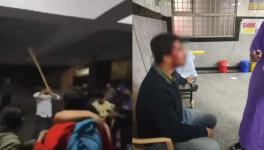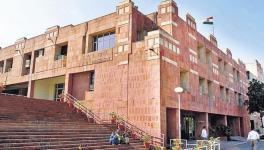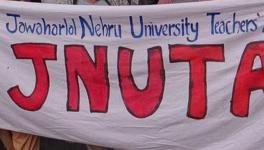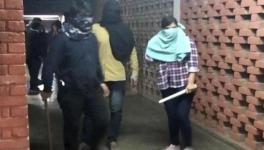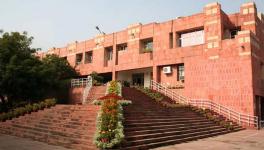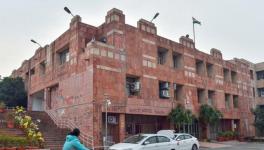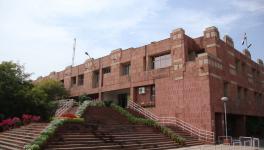Clampdown on Democratic Voices, Says JNUSU on new Manual of Discipline for Students
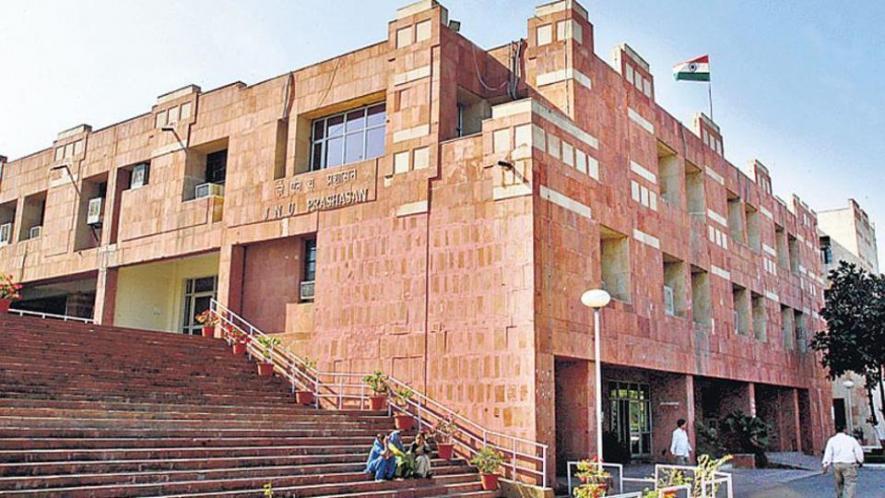
File Photo
New Delhi: The new manual of Rules of Discipline and Proper Conduct of Students, that imposes fines and expulsion for acts like holding protests in campus, pasting posters, making wall graffiti, has invoked strong reactions from the JNU Students Union (JNUSU).
Reacting on the new manual by the chief proctor’s office, made public on December 11, JNUSU said it was a clampdown on democratic voices within the campus who have been persistently asking for conducting students union elections and seeking accountability in administrative affairs.
As per the new manual, students can be fined up to Rs 20,000, two semesters suspension from hostel for hunger strikes, dharnas, group bargaining and any other form of protest within 100 meter radius of any academic and administrative complexes and/or by blocking entrance or exit of any academic and administrative complexes.
The punishment becomes severe in category-III of the offences under the manual where gheraos, laying siege or staging demonstrations around the residence of any member of the university community or any other form of coercion, intimidation or disturbance of right to privacy of the residents
of the campus would lead to a fine up to Rs 20,000, withdrawing of hostel facility, cancellation of admission or withdrawal of degree or denial of registration for a specified period, rustication and declaring out of bounds from entire JNU campus up to four semesters and expulsion from the university.
There was no discussion on the new manual in the Executive Council meeting on November 28, Aishe Ghosh, president, JNUSU told NewsClick.
“The manual attacks the vibrant democratic culture in the campus where students’ organisations organise dharnas and protest to seek accountability if they feel that their voices have not been heard. The university did not consult students’ and teachers’ bodies on the new set of guidelines. What’s disturbing is that the students’ representatives have been issued notices and fines under the new manual for using the students' union office. The practice cross-checking under proctorial hearings, where students can present their side, has been abandoned. Besides a ban on protests in the campus, it is a money-making tool where hefty fines will be imposed on students.”
Commenting on the Vice Chancellor Shantashree Pandit’s recent statement, Ghosh said “it is interesting to see that our Vice-Chancellor recently described Prime Minister Narendra Modi as the tallest spokesperson for democracy, whereas in the campus, she is adamant on decimating democracy.”
The JNUSU president said, “We believe universities are centres for learning, debate and dissent and students’ organisations have every right to exercise democratic choices in the form of dharnas, protests etc.”
Taking a dig at the new National Education Policy (NEP), Ghosh said it was “also ironic that that NEP recommends revolutionising the education sector, whereas the government is using the same document to kill unions in campuses across the country. We are still waiting for union elections in the university which the administration has avoided so far.”
In a statement, JNUSU said, “In the last few months, the university administration has used the office of the Chief Proctor to carry out a political vendetta against student activists and representatives raising important student community issues. It has converted the office of the Chief Proctor (CPO) into a centre for Political Inquisition, and has dropped all pretense towards being an impartial body and has crossed all bounds of shamelessness and partisanship.”
It adds that, “In this semester alone, we have seen how the Chief Proctor’s office has taken targetted actions against several student activists for raising concerns of the student community. Several residents of Shipra Hostel were doubly fined by the Warden and Proctor for resisting an unjust hostel checking, former JNUSU Councillor Swati was rusticated for questioning the guards who had allowed the entry of ABVP activists during the admission process, Hostel Presidents and student activists were fined for marching to the Vice-Chancellor’s House demanding right to water in the university. While students are being attacked for raising questions regarding rights, ABVP goons who have repeatedly indulged in violence are roaming scot-free without facing any enquiry or action despite ample evidence against them.”
Brahma Prakash, Member, Executive Council of JNU, told NewsClick over phone that there were several inconsistencies with the document. “The meetings of the executive council are still conducted online where members like us are given very less time to respond. What’s more problematic is that today is the last day to furnish observations on the minutes of the meeting and any final decisions would take place once we have submitted it. I fail to understand how you can upload the document on the website stating that it has the approval of the Executive Council when the due process has not been completed yet.”
Prakash added that the administration told members that there were no changes in the document from the earlier version and it was brought to EC to seek legal validation whereas we are finding vital changes to the document.”
Get the latest reports & analysis with people's perspective on Protests, movements & deep analytical videos, discussions of the current affairs in your Telegram app. Subscribe to NewsClick's Telegram channel & get Real-Time updates on stories, as they get published on our website.









